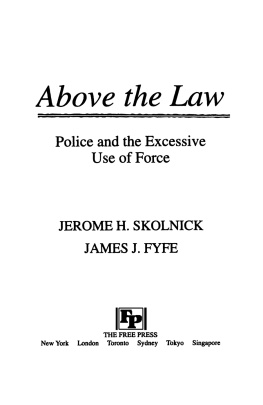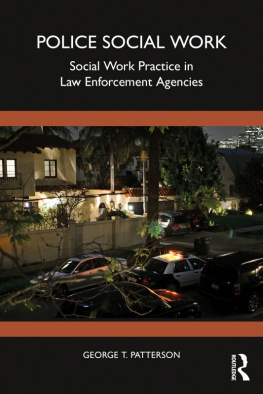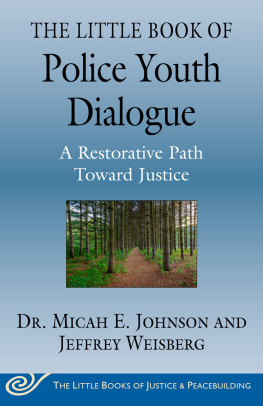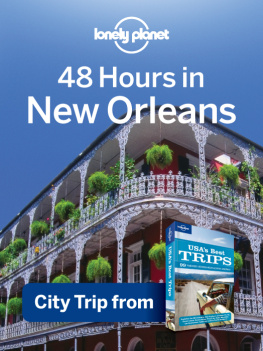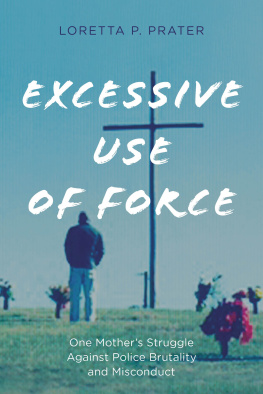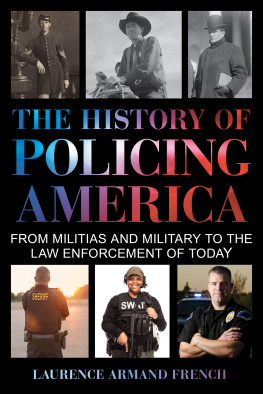Thank you for purchasing this Free Press eBook.
Sign up for our newsletter and receive special offers, access to bonus content, and info on the latest new releases and other great eBooks from Free Press and Simon & Schuster.
C LICK H ERE T O S IGN U P
or visit us online to sign up at
eBookNews.SimonandSchuster.com

Contents

Acknowledgments

Each of us has been writing and thinking about police for more years than we care to remember. We wish to acknowledge scholars and practitioners who, through writings, conversations, and example, have been especially influential in shaping our ideas and visions of police and policing. These include David H. Bayley, Egon Bittner, Paul Chevigny, Herman Goldstein, Gary Hayes, Mark H. Haller, Roger Lane, Carl B. Klockars, Peter K. Manning, Joseph McNamara, William Ker Muir, Albert J. Reiss, Jr., James Richardson, Clifford D. Shearing, Lawrence Sherman, James K. Stewart, John Von Maanen, Samuel Walker, William Westley, and James Q. Wilson.
Most of all, we wish to acknowledge the contributions of Patrick V. Murphy, who has done more than any other cop in this century to improve the professional and human quality of American policing and to make the police officers lot a happier one. We dedicate this book to him.
In addition, Skolnick wishes to acknowledge Elliot Currie for his insights into crime causation; also Joseph Brann, Lee P. Brown, Raymond Davis, Charles Gain, George Hart, Peter Sarna, Paul Walters, and Hubert Williams for showing him around the world of policing and police administration; Susan Martin for teaching him about women and policing; Robert Fogelson for introducing him to police history; Robert Reiner and Hans Klette for their colleagueship in England and Scandinavia; Abraham S. Goldstein, whose 195960 Yale Law School criminal procedure seminar made him recognize the importance of cops to the American system of criminal justice; and Richard D. Schwartz, who began as a teacher and continues as a colleague and friend.
At Berkeley, Skolnick discussed aspects of the project with colleagues Meir Dan-Cohen, Malcolm Feeley, Philip Johnson, Sanford Kadish, Sheldon Messinger, Philip Selznick, Jeremy Waldron, and Franklin Zimring, all of whom have contributed to his writing and thinking more than they know. Robert Post, ever a constant friend, was especially encouraging at a time when the enterprise seemed immensely formidable.
Students in the Guggenheim Crime Seminar offered useful comments, and staff in the Jurisprudence and Social Policy program and the Center for the Study of Law and Society have been warmly supportive. Rod Watanabe has been, as always, indispensable as administrator and crony. Margo Rodriguez, resident computer whiz, was indispensable in solving software problems. Research assistants Richard Leo and Benjamin Douglas made valuable contributions at different stages of the project.
Skolnick has been the beneficiary of a grant to the Law and Society Center from the Daniel and Florence Guggenheim Foundation. He thanks the Foundation and Jameson Doig for generous support. Some of this book was written in Bellagio, Italy, at the Villa Serbelloni of the Rockefeller Foundation Study Center, in the summer of 1991. This was a magnificent setting with congenial scholars-in-residence, especially Albert Alschuler, Jack Greenberg, and Linda Kerber, who commented on parts of the manuscript. Skolnicks most kindred companion in Bellagio, as in Berkeleyin life itselfwas Arlene Skolnick, who cultivates their Embattled Paradise to minimize combat and maximize pleasure.
Fyfes thinking has been influenced in two phases: as a student and scholar and as a police officer. In the former, those who have been most important to him as friends, teachers, and colleagues have been Richard Bennett, Mark Blumberg, Thomas Brady, Fred Cohen, Brian Forst, Jack Greene, Robert Hardt, Michael Hindelang, David Klinger, Richard Myren, Donald Newman, Arthur Neiderhoffer, Carl Pope, Lloyd Sealy, Rita Simon, Jack Sulger, and Hans Toch. Fyfes views on the police and their use of force have also been influenced by the work of Arnold Binder, Samuel Chapman, William Geller, and John Goldkamp.
However important these scholars and friends have been, Fyfes consideration of police matters could not have developed without his years and associations during his first life in the New York City Police Department. Among those who showed him by example what it meant to be a good cop or a good boss there are Joe Barcia, Neil Behan, Joe Benson, Dick Condon, Walter Connery, Marty Delehanty, John Dovnar, Pete Edelberg, Pat Fitzsimons, Kenny Gooding, Larry Hanratty, Jerry Kerins, Eddie Lanzetta, Frank McGee, Bob McGuire, Bill McInerney, Tom McTernan, Vernon Musgrove, George Najarian, Bob ONeill, Charley Reuther, Carl Sicignano, Dick Sullivan, Fred Thomas, and George Weinert. Although they were neither cops nor bosses, Betsy Gotbaum and Jean Michael were among the best of Fyfes police partners.
One of the most pleasant discoveries during Fyfes second life was the great number of good cops and good bosses to be found beyond New York Citys limits. Among those who have been most inspiring and influential have been Samuel Baca, Eduardo Gonzalez, Daniel Guido, Sean Hayes, Bobbie Jones, Morton Solomon, Fred Taylor, Mack Vines, and John Wilson. Fyfes colleagues and associates from the Commission on Accreditation for Law Enforcement Agencies, especially Sylvester Daughtry, John Duffy, Steve Harris, Dana Mitchell, Charles Plummer, and Charles Reynolds, have been excellent sounding boards.
Even more pleasant was the discovery that the civil rights bar across the nation, with whom Fyfe worked as an expert witness, included dozens of capable, ethical, even courageous attorneys who have made a genuine difference in policing and the law governing police.
Fyfes finaland specialacknowledgment is to his wife, Candace McCoy, who has been his most inspiring and challenging colleague, critic, and good cop to his bad cop.
Prologue
Whatever Happened to Dragnet?
The television program Dragnet was one of the great instruments to give the people of the United States a picture of the policeman as he really is. It was most authentic. We participated in the editing of the scripts and in their filming. If we had any objections on technical grounds our objections were met. This program showed the true portrait of the policeman as a hard-working, selfless man, willing to go out and brave all sorts of hazards and work long hours to protect the community.
William H. Parker, Los Angeles Police Chief,
interview by Donald McDonald, 1962
The videotaped beating of Rodney King destroyed the Dragnet vision of the Los Angeles police, and the Simi Valley verdict, followed by the Los Angeles riots, showed us how divided we are as a nation.
America is, culturally speaking, two countries. One is urban, cosmopolitan, and multicultural. It suffers disproportionately from crime, gang violence, poverty, and homelessness. The other is suburban, relatively safe, relatively prosperous, andmost importantunicultural. Like Simi Valley, and the King trial jury, it is predominantly white and middle-class.
The cops charged with assaulting Rodney King committed their crimes in the first America, but they were tried in the second. That they were was a failure of the local prosecutor, for reasons that remain obscure. The district attorney might have been overconfident or might have leaned over backward to be fair to the cops. After all, local district attorneys are normally on the side of the cops, which may explain other prosecutorial decisions in the King case, such as not bringing in outside police expert witnesses to interpret the videotape, or not putting King in the witness box. Yet the videotape was so compelling, had the assaulting cops been tried by a multiracial jury anywhere in urban Americain Los Angeles or San-Francisco, in Chicago or Detroit or Houstonthey would, we believe, likely have been convicted.
Next page
